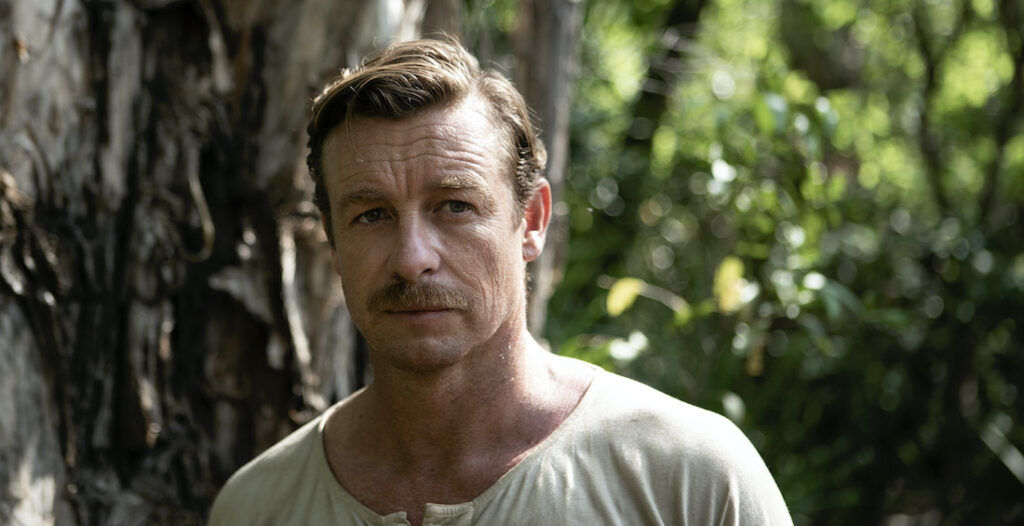“High Ground” is an epic story reminiscent of the classic American westerns with John Wayne fighting Indians. But it is set in Australia, and the conflict is between the indigenous First Peoples and the white colonial settlers in the early 20th century. Jacob Junior Nayinggul plays Gutjuk, who is trying to find his uncle before the military arrests and executes him for murder. Simon Baker plays Travis, an ex-soldier struggling with regret over his past, who helps Gutjuk. In an interview, Baker talked about playing a character who talks very little, how he found his home country of Australia changed when he returned after 20 years in America, and working with the native people to make sure the film and its production respected their land and their stories.
What are the challenges of playing a character who does not say very much?
A nonverbal character doesn’t necessarily mean that there’s not stuff going on. But he is very in his head, this guy. There are two time periods in the film, and somewhere between the first time period and the second time period Travis spent a lot of his time trying to escape from himself in a way. And himself included in that is his past and where he stands on things. He is constantly questioning his own position in the world ethically and morally. So, I think this story supports him being quite a nonverbal character. And I enjoy playing characters that have a pretty strong internal life. It’s fun. I think that strong internal life is a lot closer to me than the best characters.

Travis is a character as an individual human being. But also, he’s a metaphor illuminating the way colonial countries like Australia and the US deal with their histories.
I lived in America for 20 years and now I’ve moved back to Australia and made my own films here. I was curious about the evolution of the Australian acceptance of indigenous Australians, First Nation Australians. I was really fascinated by that when I came back because I could see a shift in certain areas of society. I found myself at a festival, one of the largest indigenous festivals in the world, Garma Festival in North East Arnhem Land. My experience at that festival was really profound and shifted a lot of my thinking and my heart in a lot of ways.
I ran into a guy that I’ve worked with, as a cinematographer, about 30 years ago, and he had grown up in the Northern Territory. He had this project that he’s been trying to get going for about 20 years. And I was really interested in it. I thought it was a really ambitious project. I liked what it was trying to do; I liked the intention behind it. And it’s the kind of thing that at this stage of my career I was really interested in being involved in as a person and interested to see how audiences would accept it if the film turned out. And I think the film has turned out to be quite a powerful movie and quite a timely film. Although I wish it had come out many years ago so that people could kind of understand it a little bit better, and be further down the track. But at the same time, I think, a really entertaining film as well. It was a really beautiful and remarkable experience. I don’t know that I’ll ever have an experience as powerful as the process of making this film.
Did creating the story help you discuss some of that history that otherwise might have been more painful to talk about?
Yes. We used, we engaged, and we were welcomed by the local community. A lot of the local communities were involved in the making of the film all the way through onto the screen. And so, you were around it every day. There’s one massacre scene in particular that grandparents of these people were there for. The frontier wars went right through to the 1930s in Australia. And it’s not something that we really learn about at school. We were told Australian history started from Captain Cook arriving. So, there’s a sort of richness of our national history that we’ve overlooked because it makes us feel uncomfortable. So yes, that was always there. It was always there not just in conversation but in the energy and the mood. The complete mood of the place, which is powerful.

One thing that makes it so powerful is the setting of the movie, the extraordinary beauty of the landscape, in contrast to some of the brutality of the story.
Oh, it was incredible. We were in country, that was, and has been nurtured and preserved and respected for 60,000 plus years by a culture that still exists, and is still intact in parts of Australia. And I had this incredible privilege to be there, to be a guest invited into that culture through the space of making this film.
There were places that we went to that no white man had ever been to. And we had traditional ceremonies by the traditional owners inviting us onto this land, and welcoming us. So, there was a lot of ceremonies, a lot of songs, a lot of tears, a lot of just the kind of stuff that opens you up as a human being and makes you feel alive and feel how our view of the world is so narrow, it’s self-centered. Just to get a glimpse into the richness of this culture was incredibly powerful, and has changed me as a person and as a man. It’s made me far more empathetic and far more open.
“High Ground” is now available on demand and on digital platforms.












